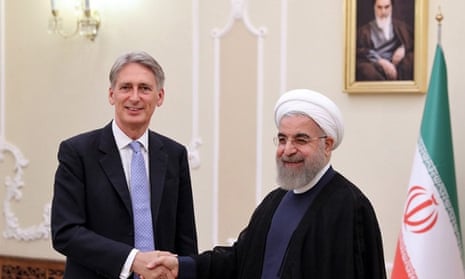The reopening of the British embassy in Iran was not greeted with much enthusiasm by some newspapers.
The Times warned foreign secretary Philip Hammond, who went to Tehran to watch the raising of the union flag, that “he should not get carried away” and urged “extreme caution.” It said:
“Iran remains a sponsor of terrorism throughout the Middle East and an egregious abuser of human rights.”
The newspaper thinks the restoration of Britain’s relationship with the Iranian regime is a byproduct of a “flawed” nuclear deal which has yet to be ratified by the US congress.
Pointing out that the initiative “will come into effect only after the International Atomic Energy Agency has worked out how Iran’s downgrading of its nuclear programme can be credibly monitored”, it continued:
“Thorough verification is at the heart of the deal. Western critics argue that its chief weakness is the opportunity provided for Iranian deception...
Inspectors will be given at best ‘managed access’ and may not be physically present when Iranian officials gather soil samples. Other rows can be expected.”
The Times, in noting a fear that British companies are eager to take advantage of “the gold rush”, contended that “every attempt to deepen business ties with Tehran carries political risk.”
Cash might well flow to Iran’s “many sinister allies” such as Syria’s Bashar al-Assad, Hezbollah and Hamas. “One possible outcome of the nuclear accord is that Iran becomes the unhindered and increasingly successful champion of bloody insurgencies in the neighbourhood while its ambitions to make a bomb are merely put on ice.”
It concluded that the UK embassy “must reach out to the people of the country while remaining deeply sceptical about the sincerity of the regime.”
The Daily Telegraph was similarly underwhelmed. It was also concerned about Iran’s allies, arguing that “the decision to reopen the Tehran embassy has been somewhat precipitate.”
It believes that it is “vital to our security interests in the Middle East and the Gulf” to stand firm with countries opposed to Iran: Israel, Saudi Arabia and the UAE. “We may have moved too fast”, said the Telegraph, adding:
“Graffiti remains on the walls of the British embassy where it was daubed by an officially sanctioned mob four years ago, leading to the breach between the two countries.
Above a portrait of the Queen is the less-than-diplomatic message ‘Death to England’. Could we not at least have insisted on that being removed before making our peace with Tehran’s theocratic rulers?”
That fact struck the Daily Mail too. It said the graffiti “serves as a telling reminder that just four years ago the embassy was overrun and ransacked by a vehemently anti-western, government-inspired mob.
“As the enemy of our enemy - Islamic State - Iran may have become a de facto ally. But it remains a very long way from being a friend.”
The Independent saw the threat of Isis - “an existential enemy in common” to Iran, Britain and the USA - as crucial to the thaw in relations between the countries. It said:
“Cynical, though, aspects of these rapprochements may be, this new relationship between the west and Iran nonetheless represents a remarkable moment of relief and hope.
Relief because it removes one of the major causes of regional instability and recurring worries about the sponsorship of terror and violence.”
As for the hope, the Indy argued that it “derives from the prospect of a strong, regionally led diplomatic, political, financial and military coalition to defeat Isis.” It continued:
“For all the military clout of the US and its allies, the interventions in Afghanistan and Iraq graphically tell us that the west can make things worse on the ground rather than better...
Not since the days of the Shah have the prospects for British interests in Iran been so bright, and this extends to trade as well.”
The Independent also carried a piece by Robert Fisk about Iran’s Islamic enemy in which he railed against “the insidious, dramatic yet almost unnoticed way in which Isis and its propagandists... have invalidated and in many ways erased one of the prime duties of journalism: to tell ‘the other side of the story.’”
With Isis revelling in its publication of its bloodthirsty activities, it is understandable that western journalists write in horrific terms of the horrors.
But Fisk is concerned that it diverts attention from an analysis of what gave birth to Isis - the decades of cruelty visited on their people by Middle Eastern despots “usually with our complete support” and the west’s own ultimate responsibility for the deaths of hundreds of thousands of Muslims.
He went on to list a set of questions that require answers. Why, for instance, “does Isis never attack Israel... why do Israel’s air raids on Syria always target Syrian government or pro-Syrian Iranian forces, but never Isis?”
Indeed, he continued, “why are Turkey’s air assaults on Isis – happily supported by Nato – far outnumbered by their air raids on the Kurdish PKK, some of whose forces in Syria are fighting Isis?
“And how come the Turkish press have publicised a convoy of weapons being taken across the Syrian border to Isis by Turkish intelligence agents?” He concluded:
“It’s not the violence in Isis videos and Dabiq we should be concentrating on. It’s what the Isis leadership don’t talk about, don’t condemn, don’t mention upon which we should cast our suspicious eye.
But that, of course, also means asking some questions of Turkey, America, Saudi Arabia, Qatar and Israel. Are we up to this? Or are we going to let Isis stop us at last from carrying out one of the first duties of our trade – reporting the ‘other side of the story’?”

